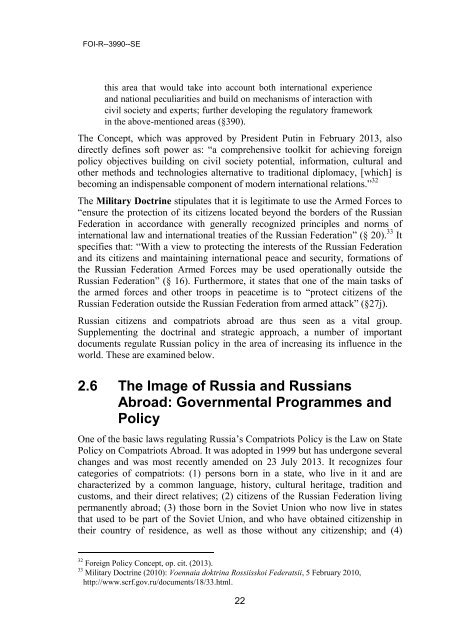FOI-R--3990--SE_reducerad
FOI-R--3990--SE_reducerad
FOI-R--3990--SE_reducerad
You also want an ePaper? Increase the reach of your titles
YUMPU automatically turns print PDFs into web optimized ePapers that Google loves.
<strong>FOI</strong>-R--<strong>3990</strong>--<strong>SE</strong><br />
this area that would take into account both international experience<br />
and national peculiarities and build on mechanisms of interaction with<br />
civil society and experts; further developing the regulatory framework<br />
in the above-mentioned areas (§390).<br />
The Concept, which was approved by President Putin in February 2013, also<br />
directly defines soft power as: “a comprehensive toolkit for achieving foreign<br />
policy objectives building on civil society potential, information, cultural and<br />
other methods and technologies alternative to traditional diplomacy, [which] is<br />
becoming an indispensable component of modern international relations.” 32<br />
The Military Doctrine stipulates that it is legitimate to use the Armed Forces to<br />
“ensure the protection of its citizens located beyond the borders of the Russian<br />
Federation in accordance with generally recognized principles and norms of<br />
international law and international treaties of the Russian Federation” (§ 20). 33 It<br />
specifies that: “With a view to protecting the interests of the Russian Federation<br />
and its citizens and maintaining international peace and security, formations of<br />
the Russian Federation Armed Forces may be used operationally outside the<br />
Russian Federation” (§ 16). Furthermore, it states that one of the main tasks of<br />
the armed forces and other troops in peacetime is to “protect citizens of the<br />
Russian Federation outside the Russian Federation from armed attack” (§27j).<br />
Russian citizens and compatriots abroad are thus seen as a vital group.<br />
Supplementing the doctrinal and strategic approach, a number of important<br />
documents regulate Russian policy in the area of increasing its influence in the<br />
world. These are examined below.<br />
2.6 The Image of Russia and Russians<br />
Abroad: Governmental Programmes and<br />
Policy<br />
One of the basic laws regulating Russia’s Compatriots Policy is the Law on State<br />
Policy on Compatriots Abroad. It was adopted in 1999 but has undergone several<br />
changes and was most recently amended on 23 July 2013. It recognizes four<br />
categories of compatriots: (1) persons born in a state, who live in it and are<br />
characterized by a common language, history, cultural heritage, tradition and<br />
customs, and their direct relatives; (2) citizens of the Russian Federation living<br />
permanently abroad; (3) those born in the Soviet Union who now live in states<br />
that used to be part of the Soviet Union, and who have obtained citizenship in<br />
their country of residence, as well as those without any citizenship; and (4)<br />
32 Foreign Policy Concept, op. cit. (2013).<br />
33 Military Doctrine (2010): Voennaia doktrina Rossiisskoi Federatsii, 5 February 2010,<br />
http://www.scrf.gov.ru/documents/18/33.html.<br />
22


